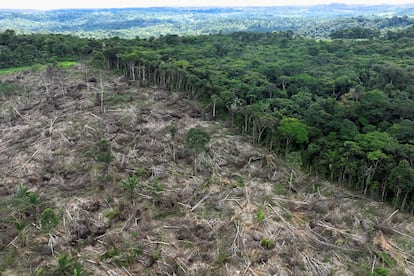Amazon deforestation falls 22% in first annual figures since Lula’s return to power
The largest rainforest in the world lost 9,001 km², an area equivalent to the size of Cyprus


The most accurate and reliable measurement has confirmed the trend suggested by preliminary data in recent months. Deforestation in the Amazon region dropped by 22.3% between August 2022 and July 2023, according to the latest annual report by Brazil’s National Institute for Space Research (INPE), released on Thursday. In other words, however, the world’s largest rainforest — a key ecosystem for mitigating global warming — lost 9,001 km² in that period, an area equivalent to the size of Cyprus. The report comes as good news for President Luiz Inácio Lula da Silva, who since his return to power has made the protection of the Amazon and the environment one of his priorities. During Jair Bolsonaro’s term in office, illegal logging escalated rapidly and it was only in his last year that the trend changed and began to decline. Bolsonaro was widely considered to be a planetary environmental villain.
The figure for annual deforestation in the Amazon represents a kind of end-of-year exam for Brazil’s government in the eyes of the outside world. They are all aware that, for more than two decades, the world has been assessing their country’s environmental performance by the percentage of increase or decrease of deforestation. During the election campaign, Lula promised zero deforestation by 2030, a highly ambitious goal.
Upon presenting the results, the minister of the Environment and Climate Change, Marina Silva, stated: “This result is the fruit of the work of all of us. It is a work for which we already had the know-how [technical knowledge] from our previous management. Now we have updated it and we are seeing these results,” explained the veteran politician, who held the same position two decades ago, also under Lula. That was the period in which deforestation in the Amazon fell most drastically. During her five years as minister in that first period, illegal logging was reduced by half to 12,900 km².
The devastation of climate change is also being felt in the Amazon. The Amazon River, the longest and largest in the world, is enduring a historic drought aggravated by El Niño, while Manaus and other cities in the region have been engulfed in a suffocating smoke from illegal fires for several weeks.
Lula is scheduled to travel to COP28, which begins at the end of the month in Dubai, and the Brazilian president will no doubt use the 22.3% drop in deforestation in the Amazon as a bargaining chip at the U.N. climate summit. He is also expected to use it in the complex negotiations that Mercosur is conducting with the European Union to try to close the trade agreement once and for all — bogged down by environmental demands. Uruguay has issued an ultimatum to reach an agreement before the end of the year. And both Lula and the Spanish prime minister, Pedro Sánchez, have pledged to reinforce efforts by that date now that Brazil presides over Mercosur and Spain over the EU.
The National Institute for Space Research (Inpe) produces this annual report on deforestation based on satellite measurements using a system called Prodes. This system is much more accurate in calculating the area of trees that have disappeared than the Deter system, which provides weekly data but is based on alerts used by teams of environmental agents to mobilize inspectors.
President Lula and Marina Silva put aside their differences to unite in the electoral campaign on the shared quest to defeat Bolsonaro at the ballot box. The demand of the former rubber tapper to support the leader of the Brazilian left was that the environmental protection policy should be transversal. She called for political commitment and the means to do so. Minister Silva has rejoiced that the number of environmental inspectors has doubled with this government.
Bolsonaro came to power in 2018 on a rhetoric of contempt for environmental policies and denial of the climate emergency that encouraged all kinds of criminals who illegally exploit the Amazon. For the former military man, the most effective way to combat destitution in the region, the poorest in Brazil, was to exploit the riches of the rainforest.
Sign up for our weekly newsletter to get more English-language news coverage from EL PAÍS USA Edition
Tu suscripción se está usando en otro dispositivo
¿Quieres añadir otro usuario a tu suscripción?
Si continúas leyendo en este dispositivo, no se podrá leer en el otro.
FlechaTu suscripción se está usando en otro dispositivo y solo puedes acceder a EL PAÍS desde un dispositivo a la vez.
Si quieres compartir tu cuenta, cambia tu suscripción a la modalidad Premium, así podrás añadir otro usuario. Cada uno accederá con su propia cuenta de email, lo que os permitirá personalizar vuestra experiencia en EL PAÍS.
¿Tienes una suscripción de empresa? Accede aquí para contratar más cuentas.
En el caso de no saber quién está usando tu cuenta, te recomendamos cambiar tu contraseña aquí.
Si decides continuar compartiendo tu cuenta, este mensaje se mostrará en tu dispositivo y en el de la otra persona que está usando tu cuenta de forma indefinida, afectando a tu experiencia de lectura. Puedes consultar aquí los términos y condiciones de la suscripción digital.








































